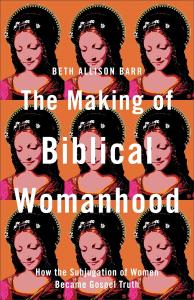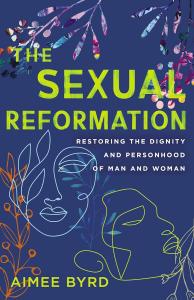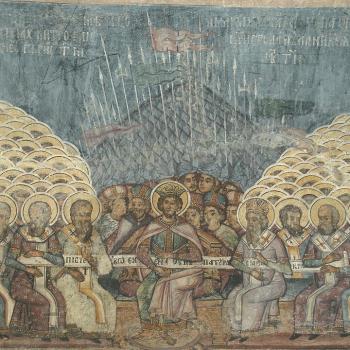I often blog about gender history and theology for the Anxious Bench. I also blog about a great many other things. I was curious about my patterns over time, so I recently went and looked up when I first began writing monthly here. It was just over 5 years ago, in Summer 2019. The post was entitled “When Gender Theology Doesn’t Fit in Our Boxes: Then and Now.”
 As I recall, it was my friend and Baylor colleague Beth Allison Barr who invited me. For those of you keeping track at home, that was before the publication of The Making of Biblical Womanhood. At the time my friend and fellow Notre Dame PhD Kristin Du Mez was also blogging at the Bench, and, yes, that was also before the publication of Jesus and John Wayne. Both women were using their Anxious Bench posts to try out the ideas that would inform these works. I was drawn to the Anxious Bench in part by a desire to have a space to do the type of work I saw them doing: using their historical research to inform a theological intervention that was accessible to and useful to a wider Christian audience.
As I recall, it was my friend and Baylor colleague Beth Allison Barr who invited me. For those of you keeping track at home, that was before the publication of The Making of Biblical Womanhood. At the time my friend and fellow Notre Dame PhD Kristin Du Mez was also blogging at the Bench, and, yes, that was also before the publication of Jesus and John Wayne. Both women were using their Anxious Bench posts to try out the ideas that would inform these works. I was drawn to the Anxious Bench in part by a desire to have a space to do the type of work I saw them doing: using their historical research to inform a theological intervention that was accessible to and useful to a wider Christian audience.
As I tell my students, I am a professional historian and a semi-professional theologian. Which is to say I have a PhD in history from Notre Dame but I also have an MA in Church History from broadly evangelical Gordon-Conwell Theological Seminary. The MA consisted of about half the coursework for an MDiv plus additional church history courses.
This is also to say that history and theology are different activities. You can do them both in the same piece of writing, but it’s important to understand that they’re different and be clear about how you’re combining them. I have long admired how the Anxious Bench is a space to do either straight history or that mix. And history has something important to offer theology.
One of the things that blew my mind when I was at seminary was learning that theology is contextual, which is to say incarnational. Theology is communicating God’s revelation in terms that make sense to a particular time and place and also doing the kind of thing that the apostle Paul did in his letters: teasing out how the logic of the gospel applies to different concrete situations, which are necessarily specific to their moment.
History is an account of that specificity. It’s about what happened and why. The kinds of questions we ask of the past and the kinds of explanations we find plausible are the product of our individual and collective lives in the present. But good history should be compelling to people from other contexts: it’s ultimately empirical.
Good theology, by analogy, is compelling to fellow Christians who share the basic commitments of a particular stream of Christianity, or, ideally, of simply the gospel itself. But because it requires prior commitment to first principles, it is not empirical in the same way. There’s a normative or ethical component to it that does not exist in history to the same extent. That’s not to say it doesn’t exist in history at all: as I’ve written before, who we choose to study and give voice to and the questions we ask of the past requires selection and hence ethical reflection.
The Anxious Bench has provided me and other historians a space to use our expertise as historians to raise questions for contemporary Christians that beg for theological reflection: If thus and such characteristic of our culture or of the modern church arose in such and such a way, should we perhaps think more carefully about it? If Christians in other times and places thought differently, should we reconsider our perspectives or at least the strength with which we hold them?
What we have learned about the past can also inform not only deconstruction of problematic theological beliefs or assumptions but also the construction of new, hopefully better ones. History provides the fodder for fine-grained analysis of human nature and the character and beliefs and circumstances that tend to lead individual Christians and the church at large to greater or lesser Christ-likeness.
When I told Beth I would agree to get on board I told her that I had been inspired by her and Kristin’s work in exposing the problematic assumptions about gender that permeate the contemporary church. After all, my very first Anxious Bench post was actually a guest post back in 2016 that critiqued evangelical thought leaders for publishing favorite book lists every year with no female authors on them.
At the same time, I mentioned that my passions are slightly different, and, in a way, build on that foundation. I am by personality a nuancer. That trait allows me to write to those who might not otherwise be open to considering the areas for growth in the contemporary American church’s attitudes toward gender and race. Specifically, I’m interested in exploring possibilities for a more robust theology of what I call “gender difference egalitarianism,” which is to say a theology of the meaningfulness of maleness and femaleness that isn’t hierarchical.
Beth said go for it. The beauty of the Anxious Bench is that we sing not in unity but in harmony—and perhaps the occasional productive cacophony. Which is how the Body of Christ is supposed to work. I have ended up writing here on a wide variety of topics in both the pure history and history-theology combo modes. Strikingly, I have found that the posts at the center of my passions are generally the most widely read. Perhaps this phenomenon is akin to the way the spiritual gifts of different church members are given to build up the Body of Christ.
Let me close with two concrete examples: First, my favorite Anxious Bench post in this vein, and one of my most viewed, is entitled “Two Questions for Complementarians (and One for Egalitarians).” In it I lay out key problems with complementarian theology as often practiced in churches, explain where those problems come from historically, and challenge complementarian church leaders to ask two sets of hermeneutical questions about their interpretations of gender-related Bible passages:
“What would this interpretation mean for church life on the ground? Would that be consistent with what we know about God and His plans for the church?” and “If we lived out this interpretation, what would we be saying about God? What is beautiful about it?”
I conclude, though, with a challenge to egalitarian theologians, which I’ll quote:
“One reason complementarian teaching remains popular is that many people consider being male or female a central part of their identity. They want it to mean something. And Christians who hold a theology of a purposeful creation rightly ask what God intended by two sexes. Unfortunately, I have yet to encounter a robust egalitarian theological treatment of the meaning and significance of sexual difference. So my final question for egalitarians is: If such a work exists and I’ve missed it, would you let me know? And if not, who wants to write it?”
 No one had an answer for me at the time, but, fascinatingly, in relatively short order, two new books were released that began to construct such a vision. I reviewed Aimee Byrd’s The Sexual Reformation for the Anxious Bench and Abigail Favale’s The Genesis of Gender for Current. That review (along with my review–later posted unpaywalled at the Anxious Bench–of Beth Moore’s wonderful autobiography All My Knotted-Up Life, which touches on some neighboring issues) was in the top five book reviews of over thirty published at Current that year. I conclude that I am not the only Christian asking these questions, and that the perspective a historian/theologian hybrid can bring to them is helpful to others thinking through them.
No one had an answer for me at the time, but, fascinatingly, in relatively short order, two new books were released that began to construct such a vision. I reviewed Aimee Byrd’s The Sexual Reformation for the Anxious Bench and Abigail Favale’s The Genesis of Gender for Current. That review (along with my review–later posted unpaywalled at the Anxious Bench–of Beth Moore’s wonderful autobiography All My Knotted-Up Life, which touches on some neighboring issues) was in the top five book reviews of over thirty published at Current that year. I conclude that I am not the only Christian asking these questions, and that the perspective a historian/theologian hybrid can bring to them is helpful to others thinking through them.
I want to close with one additional thought about Christian historians engaging in public-facing theological work. To state an obvious point, I am a woman. So when I write about how a better gender theology would make things better for women—and, in fairness, for men—I am in some ways always serving myself. So I think it’s important that I also steward my platform, such as it is, in ways that aren’t about me. That’s why I’m grateful that my single most-read post has nothing to do with gender. It is about how Christians can think about our present response to African American history.
Public scholarship means speaking what’s on our heart, but it also means speaking up for others.
An extended version of this post was first delivered at The Conference on Faith and History’s Biennial Meeting at Samford University, October 10-12, 2024.













